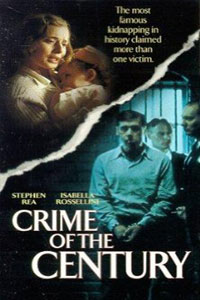
CRIME OF THE CENTURY
US, 1996, 114 minutes. Colour.
Stephen Rea, Isabella Rossellini, J.T. Walsh, Michael Moriarty, Allen Garfield, John Harkins, Barry Primus, David Paymer, Burt Remsen, Gerald S. O’Loughlin?.
Directed by Mark Rydell.
Crime of the Century is a Home Box Office telemovie based on a book by Sir Ludovic Kennedy. Kennedy has spent a career examining famous cases and exposing injustice. He is highly critical of the treatment of Bruno Richard Hauptmann, who was convicted and executed in 1936 for the kidnapping and murder of the baby of veteran flyer Charles Lindbergh. The screenplay was adapted by William Nicholson (writer of Shadowlands). The film was directed by Mark Rydell, best known for such films as The Cowboys, The Rose, On Golden Pond.
Irish actor Stephen Rea is strong as Hauptmann, with support from Isabella Rossellini as his wife. J.T. Walsh, in one of his final roles, appears as Colonel Norman Schwarzkopf, the policeman in charge of the investigation. David Paymer is also very good as the prosecuting lawyer, David Paymer, the New Jersey Attorney-General?. Comparisons could be made with the telemovie, made twenty years earlier, The Lindbergh Kidnapping Case with Anthony Hopkins as Hauptmann.
The case is significant in Clint Eastwood's J. Edgar.
1. The reputation of Lindbergh in the United States? In the world? His achievement? American hero? The kidnapping of his baby? The death of the child? The crime of the century? Hauptmann, his trial, his execution – and the later re-examination of the evidence?
2. Sixty years later, investigative journalism, the reassessment of the evidence?
3. The film’s stance, pro-Hauptmann? Audience interest and sympathy?
4. The recreation of the 1930s, Lindbergh’s world, Hauptmann’s world, the migrants’ world? The American courts, prisons? Capital punishment, the electric chair?
5. The opening, the recreation of the crime, the daring, the ladder at the window, the abduction of the baby? The death of the child? The ransom money? The witnesses and Lindbergh?
6. The Germans in America, at the picnic, the group, the 1920s and leaving Europe, their hopes for the United States, becoming citizens? Bruno Hauptmann in this context, his wife, their marriage in Germany, her pregnancy?
7. Fisch, the deals? The confidence trick? The collecting of the money from the migrants? Anna and her scepticism? Hauptmann and his faith in the plan? The news of Fisch’s death in Germany, the disappearance of the money? Hauptmann finding the case that Fisch had left behind, the decision to keep the money, his using the cash? His being identified through the money? The implication about Fisch’s guilt – and for the Hauptmann?
8. Norman Schwarzkopf, the army background, his military style, experience, leading the investigation, his thoroughness, his feeling the pain as time passed, relationship with the media, the governor, the police?
9. The identifying of Hauptmann through the money, his arrest, Anna and the shock, the vigorous searching of the house, finding the case of money? The attitude of the police? The xenophobic attitudes towards Hauptmann, the media hostility?
10. Finn, his interrogations, twisting the evidence, his anger, the different assistants, the issue of the money? The single-mindedness of his interrogations? His relationship with Schwarzkopf and the presentation of the evidence? Finding ways around the evidence? Twisting the witnesses’ statements, threatening them?
11. The doctor, the threats, the witness who took the money, Lindbergh and his being questioned, his decision not to exclude the probably that Hauptmann was guilty? The use of the writing experts, the dictation of the note to Hauptmann and his comment on the misspellings, the way that this was twisted during the evidence?
12. The police, the examination, the evidence – for example the nails and the ladder?
13. Interrogating Hauptmann, his initial story, telling lies about the money, his fear, admitting the truth, this being used in evidence against him? The presumption of guilt? The role of the media?
14. Anna, her character, the birth of the child, her loyalty, her continued fight for his good name? (And her continuing it until the 1990s and her death at ninety-three?)
15. The court scenes, Reilly, taking on the case, not wanting to meet Hauptmann, his vanity, his drinking, his performance in the court?
16. The role of the governor, the election, the attorney-general and Schwarzkopf, their ambitions? The governor and his comment on the top lawyer coming to prosecute Hauptmann? His examination of the evidence, his asking the right questions? His visiting Hauptmann in prison, convinced of his innocence, confronting Schwarzkopf and the attorney-general, getting in Ellis Parker to do the investigation, Parker and his re-questioning the witnesses? Schwarzkopf and his registering his objection to this investigation? The compromise, the governor going to the prison, offering Hauptmann the deal, his refusal?
17. The presumption that Hauptmann would confess, his turning down the money from the newspapers for a confession? His integrity? The surprise that he did not confess?
18. The information given at the end of the film, the governor not re-elected, the attorney-general going on to lead the Democrats in New Jersey, Schwarzkopf and his career? Reilly and his alcoholism? His death?
19. The value of recreating these historical crime dramas? Insights? The critique of the methods of the past, the way that evidence was twisted, prejudice?